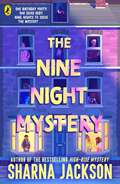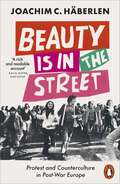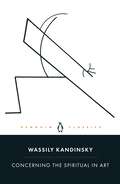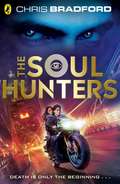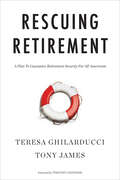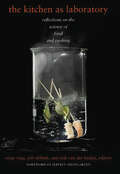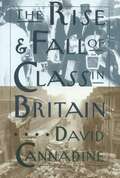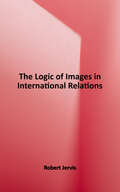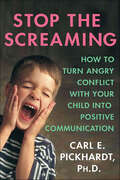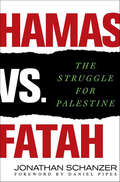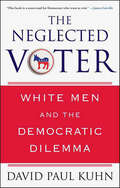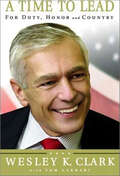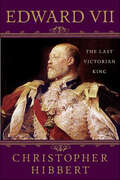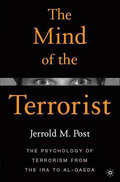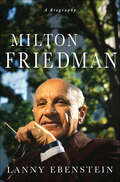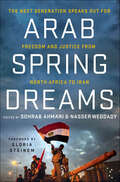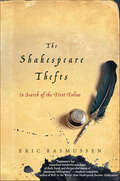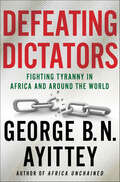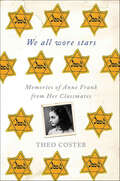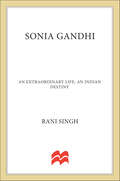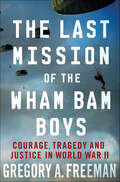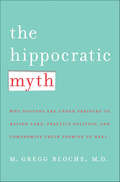- Table View
- List View
The Peasants
by Wladyslaw ReymontOne of Poland's most engrossing twentieth-century epics, by the 1924 winner of the Nobel Prize for LiteratureIn the village of Lipce, scandal, romance and drama crackle in every hearth. Boryna, a widower and the village's wealthiest farmer, has taken the young and beautiful Jagusia as his bride - but she only has eyes for his impetuous son Antek. Over the course of four seasons - Autumn to Summer - the tangled skein of their story unravels, watched eagerly by the other peasants: the gossip Jagustynka, pious Roch, hot-blooded Mateusz, gentle Witek ... Richly lyrical and thrillingly realist, at turns comic, tragic and reflective, Wladyslaw Reymont's magnum opus is a love song to a lasting dream of rural Poland, and to the eternal, timeless matters of the heart.
The Nine Night Mystery
by Sharna JacksonA page-turning, fast-paced, twisty murder mystery packed with epic reveals, red herrings and sharp, real, funny teen dialogue, perfect for fans of Robin Stevens and the Lizzie and Belle Mysteries, from the award-winning author of High-Rise Mystery and The Good Turn.Last night Wesley and his friends Josephine and Margot threw their neighbour Rachel a surprise birthday party.This morning, Rachel is dead. And Wesley is the one who finds her body. Rachel's friends throw a traditional Caribbean Nine Night celebration to help guide her soul to the next world. But Wesley, Margot and Josephine don't have time to mourn Rachel. They are determined to find out who did this - and find out what secrets Rachel was keeping... Praise for Sharna Jackson: 'I utterly loved The Good Turn; it's bone-deep brilliant; a joy to the very end. It's so warm and so funny, and so ferociously on the side of justice and of hope. I adored it.' - Katherine Rundell
Beauty is in the Street: Protest and Counterculture in Post-War Europe
by Joachim C. Häberlen'A rich and readable account of left-wing activism in the West and opposition to Soviet-style communism in the East' Katja Hoyer, The Spectator'A dream, perhaps, but one that still sounds worth fighting for, even beautiful' Stuart Jeffries, The Observer'An ambitious and masterly account of utopian protest in Europe ... Fast-paced, with an eye for telling detail and written with a light touch' Robert GildeaIn post-war Europe, protest was everywhere. On both sides of the Iron Curtain, from Paris to Prague, Milan to Wroclaw, ordinary people took to the streets, fighting for a better world. Their efforts came to a head most dramatically in 1968 and 1989, when mass movements swept Europe and rewrote its history.In the decades between, Joachim C. Häberlen argues, new movements emerged that transformed the nature of protesting. Activism moved beyond traditional demonstrations, from squatting to staging 'happenings' and camping out at nuclear power plants. People protested in the way they dressed, the music they listened to, the lovers they slept with, the clubs where they danced all night. New movements were born, notably anti-racism, women's liberation, gay liberation, and environmentalism. And protest turned inward, as activists experimented with new ways of living and feeling, from communes to group therapy, in their efforts to live a better life in the here and now.Some of these struggles succeeded, others failed. But successful or not, their history provides a glimpse into roads not taken, into futures that did not happen. The stories in Häberlen's book invite us to imagine different futures; to struggle, to fail, and to try again. In a time when we are told that there are no alternatives, they show us that there could be another way.
Concerning the Spiritual in Art
by Wassily KandinskyA seminal text in the history of modern art, from one of the most famous artists of the twentieth century‘Art is the language that speaks to the soul’Why do we make art? In Concerning the Spiritual in Art Wassily Kandinsky, one of the earliest and most famous abstract painters, argued against ‘art for art’s sake’. Exploring form and colour, spirituality and tradition, Kandinsky instead predicted a future for painting in its potential to redirect the attention of viewers away from the shallow materialism of the modern world toward the more profound intellectual and emotional concerns of their interior lives. His revolutionary work became a landmark in modern art history, helping to usher in the age of non-representational painting. This new translation also includes Kandinsky’s later essay, ‘The Question of Form’, in which he interrogates and sharpens many of his earlier ideas.A new translation by Ruth Ahmedzai KempWith an introduction by Lisa Florman
The Soul Hunters (The Soul Series #1)
by Chris BradfordHave you ever experienced dreams so vivid it seems like you have lived them? Or had déjà vu so strong you're convinced you must have been there before?The explosive first book in a brand new action-packed series from bestselling author Chris Bradford.Late one night a schoolgirl is attacked in a city park. When a stranger rushes to her rescue, Genna Adams believes it's luck that their paths crossed. Then a week later, the same boy saves her from being kidnapped and Genna realises this is no coincidence. But the explanation offered by the boy, Phoenix, is even stranger than she could have imagined - a long-forgotten foe has tracked her across lifetimes to lay claim to Genna's very soul.As the hunters close in, Genna has no choice but to trust her mysterious protector - and soon she is swept into a deadly adventure, racing across time to save herself and, ultimately, the human race.Because for Genna, death is only the beginning...
Rescuing Retirement: A Plan to Guarantee Retirement Security for All Americans
by Teresa Ghilarducci Tony JamesRetirement shouldn&’t be just for the rich: &“Finally, a practical plan to address Americans&’ lack of adequate retirement savings.&”—Michael Bloomberg Everyone deserves to be able to retire with dignity, but this core feature of the social contract is in jeopardy. Companies have swerved away from pensions, and most of the workforce has woefully inadequate retirement savings. If we don&’t act to fix this broken system, rates of impoverishment for senior citizens threaten to skyrocket, and tens of millions of Americans reaching retirement age in the coming decades will be forced to delay retirement and will experience a dramatic drop in their standard of living. In Rescuing Retirement, economist Teresa Ghilarducci and billionaire businessman Tony James offer a comprehensive yet simple plan to help workers save for retirement, increase retirement savings by earning higher returns, and guarantee lifelong income for everyone. Built on people&’s own money in individual Guaranteed Retirement Accounts, the plan requires no new taxes, no more bureaucracy, and no increase in the deficit. Speaking to Americans&’ growing anxiety about their ability to retire, Rescuing Retirement provides answers to anyone wanting to understand the growing movement to protect a period of life once considered a deserved time of rest and creativity and offers a practical guide to the future of secure retirement. &“Ghilarducci and James never slip into wonk-speak or jargon, and lay readers will appreciate the way the authors make sense of complex economic issues.&”—Publishers Weekly
The Kitchen as Laboratory: Reflections on the Science of Food and Cooking (Arts and Traditions of the Table Perspectives on Culinary History)
by César Vega, Job Ubbink and Erik van der Linden&“Provides good perspective on the scientific approach to cooking while reflecting the interests and passions of each essay&’s author.&”—Peter Barham, author of The Science of CookingIn this global collaboration of essays, chefs and scientists advance culinary knowledge by testing hypotheses rooted in the physical and chemical properties of food. Using traditional and cutting-edge tools, ingredients, and techniques, these pioneers create, and sometimes revamp, dishes that respond to specific desires and serve up an original encounter with gastronomic practice. From the seemingly mundane to the food fantastic—from grilled cheese sandwiches, pizzas, and soft-boiled eggs to Turkish ice cream, sugar glasses, and jellified beads—the essays in The Kitchen as Laboratory cover a range of creations and their history and culture. This collection will delight experts and amateurs alike, especially as restaurants rely more on science-based cooking and recreational cooks increasingly explore the physics and chemistry behind their art. Contributors end each essay with their personal thoughts on food, cooking, and science, offering rare insight into a professional&’s passion for playing with food.&“Where else can one have fun pondering the acoustics of crunchy foods or the texture of an ice cream that stretches like a rubber band?&”—Robert Wolke, author of What Einstein Told His Cook: Kitchen Science Explained &“Not only an in-depth study of many areas of food science, but also an entertaining read. For someone like me, who relishes understanding more about cooking from the inside out, it&’s heartening to see this area of literature expanded.&”—Chef Wylie Dufresne, wd~50
Vaccines and Your Child: Separating Fact from Fiction
by Paul A. Offit Charlotte A. MoserA book for all parents who want the best information about childhood immunizations.Paul A. Offit and Charlotte A. Moser answer questions about the science and safety of modern vaccines. In straightforward prose, they explain how vaccines work, how they are made, and how they are tested. Most important, they separate the real risks of vaccines from feared but unfounded risks. Offit and Moser address parental fears that children may receive too many vaccines too early, that the HPV vaccine may cause chronic fatigue or other dangerous side effects, that additives and preservatives in vaccines cause autism, and that vaccines might do more harm than good. There couldn't be a better moment or more pressing need for this book, which offers honesty—instead of hype—in the quest to protect children's health.&“The perfect book for parents seeking accurate and detailed vaccine information.&”—Ari Brown, M.D., pediatrician, author of Baby 411: Clear Answers and Smart Advice for Your Baby&’s First Year&“Makes it easier than ever for parents to wade through the abundance of information about vaccines, setting the story straight about vaccine safety.&”—Rosalynn Carter, former First Lady, cofounder Every Child By Two
The Rise and Fall of Class in Britain
by David CannadineAlthough it is widely believed that the British are obsessed with class to a degree unrivaled by any other nation, politicians in Britain are now calling for a "classless society," and scholars are concluding that class does not matter any more. But has class -- once considered the master narrative of British history -- fallen, failed, and been dismissed? In this wholly original and brilliantly argued book, David Cannadine shows that Britons have indeed been preoccupied with class, but in ways that are invariably ignorant and confused. Cannadine sets out to expose this ignorance and banish this confusion by imaginatively examining class itself, not so much as the history of society but as the history of the different ways in which Britons have thought about their society. <P><P>Cannadine proposes that "class" may best be understood as a shorthand term for three distinct but abiding ways in which the British have visualized their social worlds and identities: class as "us" versus "them;" class as "upper," "middle," and "lower"; and class as a seamless hierarchy of individual social relations. From the eighteenth through the twentieth century, he traces the ebb and flow of these three ways of viewing British society, unveiling the different purposes each model has served.
The Logic of Images in International Relations
by Robert JervisThe subject of this book is a little-discussed aspect of international politics, the ways states can affect the images others have of them and thereby exercise influence without paying the high cost of altering their own major policies. Military and economic resources, the main instrumentalities of power, have been widely studied. Less has been written about the role of diplomatic skill, and the authors of this literature have rarely focused on the full range of techniques by which a state can influence the inferences others are making about it and have not explored in any detail the ways desired images, which may be accurate or inaccurate, not only supplement the more usual forms of power but are indispensable for reaching certain goals.
The Last Judgment: Michelangelo and the Death of the Renaissance
by James A. ConnorPainted on the altar wall of the Sistine Chapel, 28 years after Michelangelo completed the glorious and hopeful ceiling, The Last Judgment is full of stark images depicting the End of Days. James Connor uses the famous fresco as the lens by which to view the end of the Renaissance, arguing that Michelangelo's imagery and composition reflect the religious and political upheavals of the time.Combining his flair for storytelling with incisive historical analysis, Connor demonstrates how the Counter-Reformation arose from the ashes of Renaissance Italy, and how that sea change altered the course of Western history.
Stop the Screaming: How to Turn Angry Conflict with Your Child into Positive Communication
by Carl E. PickhardtParenting expert Carl E. Pickhardt brings his considerable experience to tackling the most pervasive and difficult problems parents face in childrearing. Whereas many books on family conflict focus on the prickly teenage years, Pickhardt takes the long view and treats a broad range of ages--starting from the early toddler years all the way through college. He empowers parents to turn conflict into an opportunity to engage with their children on a deeper level. Readers will learn to:- Manage emotion during a fight so that you can hear the feelings behind the vitriol without taking offense. - Give criticism to children in a way that focuses on the behavior and not the person. - Find a hook inside silent tension that will let you connect with your children's feelings and show them a way to empathize with yours.- Consider your children's point of view during a disagreement and teach them to voice their grievances with respect. With a distinctive emphasis on how to distinguish types of conflict dependent on age and gender, Pickhardt shows parents how to turn the daily battles into opportunities for growth. This is a practical guide that helps parents confront difficult issues with which all families grapple.
Hamas vs. Fatah: The Struggle for Palestine
by Jonathan SchanzerIn June 2007 civil war broke out in the Gaza Strip between two rival Palestinian factions, Hamas and Fatah. Western peace efforts in the region always focused on reconciling two opposing fronts: Israel and Palestine. Now, this careful exploration of Middle East history over the last two decades reveals that the Palestinians have long been a house divided. What began as a political rivalry between Fatah's Yasir Arafat and Hamas leader Sheikh Ahmed Yassin during the first intifada of 1987 evolved into a full-blown battle on the streets of Gaza between the forces of Arafat's successor, Mahmoud Abbas, and Ismael Haniyeh, one of Yassin's early protégés. Today, the battle continues between these two diametrically opposing forces over the role of Palestinian nationalism and Islamism in the West Bank and Gaza.In this thought-provoking book, Jonathan Schanzer questions the notion of Palestinian political unity, explaining how internal rivalries and violence have ultimately stymied American efforts to promote Middle East peace, and even the Palestinian quest for a homeland.
The Neglected Voter: White Men and the Democratic Dilemma
by David Paul KuhnIn the 1960s, the Republican Party began to win over a crucial demographic: white male voters. Presidential politics was transformed for a generation.David Paul Kuhn explains this fundamental fact behind the rise of the Republicans and the decline of the Democrats, and reminds the political left that midterm victories (1986, 2006) do not always equal sustainable success. In revealing, lucid prose, Kuhn explains how America's conservative party came to win a majority of workingmen and the White House. Grounded in practical politics, The Neglected Voter presciently reconfigures the American political landscape. Equipped with unprecedented research data, reporting, and exclusive interviews with such figures as Jimmy Carter, Norman Mailer, Mark Warner, and Pat Robertson, Kuhn examines the role of gender and racial identity in presidential politics through the social changes that have defined the last half century.
A Time to Lead: For Duty, Honor and Country
by Wesley K. Clark Tom CarhartFour-star General Wesley K. Clark became a major figure on the political scene when he was drafted by popular demand to run for the Democratic nomination for President of the United States in 2003. But this was just one of many exceptional accomplishments of a long and extraordinary career. Here, for the first time, General Clark uses his unique life experience—from his difficult youth in segregated Arkansas where he was raised by his poor, widowed mother; through the horror of Vietnam where he was wounded; the post-war rebuilding of national security and the struggles surrounding the new world order after the Cold War—as a springboard to reveal his vision for America, at home and in the world. General Clark will address issues such as foreign policy, the economy, the environment, education and health care, family, faith, and the American dream.Rich with breathtaking battle scenes, poignant personal anecdote and eye-opening recommendations on the best way forward, General Clark's new book is a tour de force of gripping storytelling and inspiring vision.
Edward VII: The Last Victorian King
by Christopher HibbertA riveting biography that vividly captures the life and times of the last Victorian king.To his mother, Queen Victoria, he was "poor Bertie," to his wife he was "my dear little man," while the President of France called him "a great English king," and the German Kaiser condemned him as "an old peacock." King Edward VII was all these things and more, as Hibbert reveals in this captivating biography. Shedding new light on the scandals that peppered his life, Hibbert reveals Edward's dismal early years under Victoria's iron rule, his terror of boredom that led to a lively social life at home and abroad, and his eventual ascent to the throne at age 59. Edward is best remembered as the last Victorian king, the monarch who installed the office of Prime Minister.
The Mind of the Terrorist: The Psychology of Terrorism from the IRA to al-Qaeda
by Jerrold M. PostIn contrast to the widely held assumption that terrorists as crazed fanatics, Jerrold Post demonstrates they are psychologically "normal" and that "hatred has been bred in the bone". He reveals the powerful motivations that drive these ordinary people to such extraordinary evil by exploring the different types of terrorists, from national-separatists like the Irish Republican Army to social revolutionary terrorists like the Shining Path, as well as religious extremists like al-Qaeda and Aum Shinrikyo. In The Mind of the Terrorist, Post uses his expertise to explain how the terrorist mind works and how this information can help us to combat terrorism more effectively.
Milton Friedman: A Biography
by Lanny EbensteinThe first biography of one of the twentieth century's greatest economic thinkers, Milton Friedman.Born the son of immigrant parents, Milton Friedman went on to become a major figure during the resurgence of American conservatism. As an advisor to the Reagan administration and a widely read columnist, he played a vital role in shaping government policy and public opinion while he made headlines for his controversial views.Drawing on author Lanny Ebenstein's unprecedented access to personal archives and to Friedman himself, this is the first book to trace his life and development as an economic theorist. With a combination of intimate personal detail and fascinating exploration of economic theory, Milton Friedman: A Biography provides a revealing look at the man regarded by many as a hero of libertarianism and laissez-faire economics.
Arab Spring Dreams: The Next Generation Speaks Out for Freedom and Justice from North Africa to Iran
by Nasser Weddady and Sohrab AhmariFrom a gay man secretly mourning his lover's suicide in Morocco to a young woman denied schooling because of religious discrimination in Iran, Arab Spring Dreams spotlights some of the Middle East's most outspoken young dissidents. The essayists cover a wide range of experiences, including premarital sex, the lack of educational opportunities, teenage marriage, and the fight for political freedom. They also highlight how repressive laws and cultural mores snuff out liberty and stifle growth and consider how previous movements - particularly the American civil rights struggle - might be channeled to effect change in their own countries. Beautifully written and profoundly moving, these stories present a decisive call for change at a crucial point in the evolution of the Middle East.
The Shakespeare Thefts: In Search of the First Folios
by Eric RasmussenPart literary detective story, part Shakespearean lore, The Shakespeare Thefts will charm the Bard's many fans.The first edition of Shakespeare's collected works, the First Folio, published in 1623, is one of the most valuable books in the world and has historically proven to be an attractive target for thieves. Of the 160 First Folios listed in a census of 1902, 14 were subsequently stolen-and only two of these were ever recovered. In his efforts to catalog all these precious First Folios, renowned Shakespeare scholar Eric Rasmussen embarked on a riveting journey around the globe, involving run-ins with heavily tattooed criminal street gangs in Tokyo, bizarre visits with eccentric, reclusive billionaires, and intense battles of wills with secretive librarians. He explores the intrigue surrounding the Earl of Pembroke, arguably Shakespeare's boyfriend, to whom the First Folio is dedicated and whose personal copy is still missing. He investigates the uncanny sequence of events in which a wealthy East Coast couple drowned in a boating accident and the next week their First Folio appeared for sale in Kansas. We hear about Folios that were censored, the pages ripped out of them, about a volume that was marked in red paint-or is it blood?-on every page; and of yet another that has a bullet lodged in its pages.
Defeating Dictators: Fighting Tyranny in Africa and Around the World
by George B. AyitteyDespite billions of dollars of aid and the best efforts of the international community to improve economies and bolster democracy across Africa, violent dictatorships persist. As a result, millions have died, economies are in shambles, and whole states are on the brink of collapse. Political observers and policymakers are starting to believe that economic aid is not the key to saving Africa. So what does the continent need to do to throw off the shackles of militant rule? African policy expert George Ayittey argues that before Africa can prosper, she must be free. Taking a hard look at the fight against dictatorships around the world, from Ukraine's orange revolution in 2004 to Iran's Green Revolution last year, he examines what strategies worked in the struggle to establish democracy through revolution. Ayittey also offers strategies for the West to help Africa in her quest for freedom, including smarter sanctions and establishing fellowships for African students.
We All Wore Stars: Memories of Anne Frank from Her Classmates
by Theo CosterIn 1941, Theo Coster was a student at the Amsterdam Jewish Lyceum, one in a class of 28 Jewish children that the Nazis had segregated from the rest of the Dutch population. Among Theo's fellow students was a young Anne Frank, whose diary would later become one of the most important documents of the Holocaust. In this remarkable group portrait, Coster and five of his fellow classmates gather their personal stories and memories of Anne. The accounts collected here do not just help us to rediscover Anne Frank. They also stand on their own as remarkable stories of ingenuity and survival during the Holocaust--from Albert Gomes de Mesquita, who hid in ten different towns across Europe--to Hannah Goslar, who experienced the horrors of Bergen-Belsen but also made a miraculous reconnection with Anne days before her death.
Sonia Gandhi: An Extraordinary Life, An Indian Destiny
by Rani SinghSonia Gandhi's story represents the greatest transformational journey made by any world leader in the last four decades. Circumstance and tragedy, rather than ambition, paved her path to power. Born into a traditional, middle-class Italian family, Sonia met and fell in love with Rajiv Gandhi, son of future Indian prime minister Indira Gandhi and grandson of Jawaharlal Nehru, while studying English in Cambridge. Cruelly tested by the assassinations of her mother-in-law and of her husband, Sonia grew into a strong, authoritative but always private figure, now president of a coalition ruling over a billion people in the world's largest democracy. Through exclusive interviews with members of Sonia's party, political opponents and family friends, Rani Singh casts new light on Sonia. In the first mainstream biography of this inspirational figure, the author's compelling narrative retraces the path of the brave and beautiful Sonia Gandhi, examining what her life and legacy mean for India.
The Last Mission of the Wham Bam Boys: Courage, Tragedy and Justice in World War II
by Gregory A. FreemanBefore the famed Nuremberg Tribunal, there was Rüsselsheim, a small German town, where ordinary civilians were tried in the first War Crimes Trial of World War II.As the tide of World War II turned, a hitherto unknown incident set a precedent for how we would bring wartime crimes to justice: In August 1944, the 9- man crew of an American bomber was forced to bail out over Germany. As their captors marched them into Rüsselsheim, a small town recently bombed to smithereens by Allies, they were attacked by an angry mob of civilians--farmers, shopkeepers, railroad workers, women, and children. With a local Nazi chief at the helm, they assaulted the young Americans with stones, bricks, and wooden clubs. They beat them viciously and left them for dead at the nearby cemetery.It could have been another forgotten tragedy of the war. But when the lynching was briefly mentioned in a London paper a few months later, it caught the eye of two Army majors, Luke Rogers and Leon Jaworski. Their investigation uncovered the real human cost of the war: the parents and a newlywed wife who agonized over the fate of the men, and the devastating effect of modern warfare on civilian populations. Rogers and Jaworski put the city of Rüsselsheim on trial, insisting on the rule of law even amidst the horrors of war. Drawing from trial records, government archives, interviews with family members, and personal letters, highly-acclaimed military historian Gregory A. Freeman brings to life for the first time the dramatic story. Taking the reader to the scene of the crime and into the homes of the crew, he exposes the stark realities of war to show how ordinary citizens could be drawn to commit horrific acts of wartime atrocities, and the far-reaching effects on generations.
The Hippocratic Myth: Why Doctors Are Under Pressure to Ration Care, Practice Politics, and Compromise Their Promise to Heal
by M. Gregg BlocheWhen we're ill, we trust in doctors to put our well-being first. But medicine's expanding capability and soaring costs are putting this promise at risk. Increasingly, society is calling upon physicians to limit care and to use their skills on behalf of health plan bureaucrats, public officials, national security, and courts of law. And doctors are answering this call. They're endangering patients, veiling moral choices behind the language of science and, at times, compromising our liberties. In The Hippocratic Myth, Dr. M. Gregg Bloche marshals his expertise in medicine and the law to expose how: *Doctors are pushed into acting both as caregivers and cost-cutters, compromising their fidelity to patients*Politics keeps doctors from giving war veterans the help they need*Insurers and hospital administrators pressure doctors to discontinue life-saving treatment, even when patients and family members object*Medicine has become a weapon in America's battles over abortion, child custody, criminal responsibility, and the rights of gays and lesbians*The war on terror has exploited clinical psychology to inflict harmChallenging, provocative, and insightful, The Hippocratic Myth breaks the code of silence and issues a powerful warning about the need for doctors to forge a new compact with patients and society.

